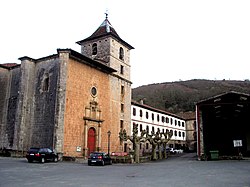Urdax
| Urdax | ||
|---|---|---|
| Village | ||
| Urdazubi / Urdax | ||
 |
||
|
||
| Country |
|
|
| Autonomous community | Navarre | |
| Province | Pamplona | |
| Government | ||
| • Mayor | Santiago Villares Oteguy. (2015) (Azkar) | |
| Area | ||
| • Total | 7.75 km2 (2.99 sq mi) | |
| Elevation | 90 m (300 ft) | |
| Highest elevation | 90 m (300 ft) | |
| Lowest elevation | 0 m (0 ft) | |
| Population (2014) | ||
| • Total | 392 | |
| • Density | 51/km2 (130/sq mi) | |
| Demonym(s) | Urdaizubitarra | |
| Time zone | CET (UTC+1) | |
| • Summer (DST) | CEST (UTC+2) | |
| Postal code | 31711 | |
| Dialing code | 948 | |
| Official language(s) | Basque / Euskera / Spanish | |
| Website | www.urdax.es | |
Urdazubi/Urdax is a village and municipality located in the autonomous community of Navarre, in the north of Spain.
Well-known because of its caves, Urdax is an interesting place for speleology at a basic level. Urdax caves were created by the underground river Urtxuma 14,000 years ago, and nowadays only a single cave can be visited by the public. The only cave that is opened to those interested on it, is the Ikaburu cave where visitors can enjoy a guided visit though its corridors and stances. The Ikaburu cave tour includes more than seeing the wonderful stalactites and stalagmites, but also stories of witches, shepherds, monks, Spanish Civil War or even contrabandists.
The Monastery of Urdax is said to had been established during the 11th century by an Augustinian Congregation who built a pilgrim hospital there for those who were doing the Way of St James. Even if the monastery is there, the original building does not longer exist due to a fire that happened in 1526 and another one in 1793. The external appearance and architecture in renaissance style, which was not the original style, and the only things that are completely original and did not disappear during the fires are the church and the cloister.
Coordinates: 43°16′02″N 1°30′16″W / 43.2672°N 1.5044°W
...
Wikipedia

